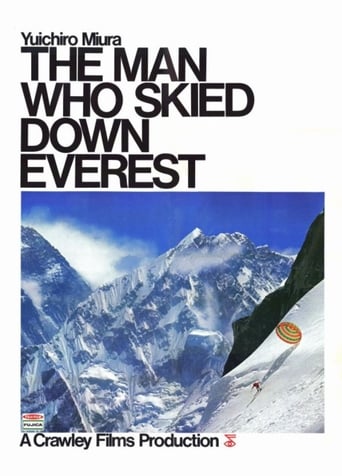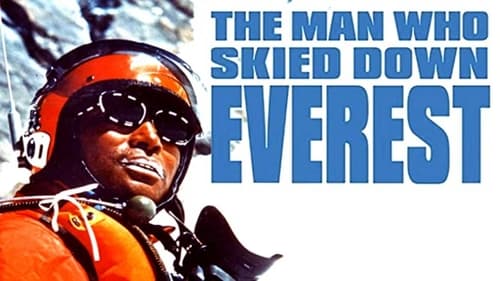jdavis68-1
This film has a two hour build-up involving the thoughts and preparations of a Japanese skier who wants to ski Everest, which culminates in an anti-climatic ski scene that lasts about 30 seconds. This is not a spoiler because this movie spoils itself. There was about 15 seconds of skiing and 15 seconds of sliding down the mountain.There was a lot of gratuitous philosophy by this Japanese guy and it was especially galling when six Sherpas who were hauling his equipment died in a snowfall and the skier opined that it was worth it because you have to take risks in life to achieve great things or something like that.There is some good photography of Everest and the way to Everest through Tibet. This film won an Academy Award for documentary in 1975.
David Hart (dhart-2)
If you are looking for a movie with beautiful shots of Mount Everest, then you may enjoy this movie. Just skip ahead to the views of the mountain.(Spoiler Alert) However, if you, like me, believe that lives are precious and not to be wasted then this movie will leave a bad taste in your mouth. 6 people died, 5 Sherpas and a member of the Japanese party just so that one man could attempt to ski down Mount Everest.The question is raised in the movie about whether the continuation of the expedition to meet his personal goal was still worth the cost in lives, and he answers an emphatic "Yes".The part about skiing is in the last 15 minutes. He skis for a short time, then falls the rest of the way until he comes to a stop in the snow.
Chukar
This film is a documentary. It was filmed 30 years ago when things in the Everest region were quite a bit different than they are today. I have had this film for some time on VHS, and If it were to come out on DVD I would buy it if I could find it. This film is very well done, but you have to be someone who can appreciate it. Its perspective is that of a Japanese, and the film represents that culture and the Japanese outlook. It shows its age more than a bit, and Miura and company hike from Katmandu to Everest Basecamp, which is seldom done anymore. But that is a good point, as it has some beautiful shots of the walk in to Everest, and relationships with the people that inhabit the areas. Nowadays, people more often fly into an airstrip that is a few hours walk to Namche Bazzar, which is the last real town of any size before you reach Everest Basecamp.The actual skiing incident, or should I say "accident," that gives the picture its title is not nearly as important, or as impressive, as the rest of the film. They could have almost talked about it rather than show it. The beauty of the film is in its cinematography and its Oriental viewpoint. There is some death in the film as there is a major accident in the Kumbu Icefall that takes the life of several Sherpas.The film is different from any other climbing film I have, and I have a great many; and I take it out and watch it at least once a year. It presents you a picture of a time and place that is long past. Miura, himself, was killed not long after his Everest adventure, doing much the same thing. I am not absolutely sure, but I believe he was attempting to ski down Denali.If you enjoy Japanese or Oriental culture, you should enjoy the film. For me the film was never dull, except for the mentioned ski accident. I love the mountains and wilderness. Perhaps my love for wild places gives me too much of a fondness for a film like this. I can only say that it is one of my favorites.Chuk'r
Mike Ciaraldi (Mike_McDuck)
I saw this movie many years ago on TV, and thoroughly enjoyed it. As a previous reviewer said, the title is somewhat misleading; I usually refer to it as "The Man Who Fell Down Everest"!What struck me about this film is that the expedition is so *Japanese*. For example, all the equipment is stencilled "JESE" for "Japanese Everest Ski Expedition". They carry collapsible bridges for crossing crevasses. And they lugged old-style videotape equipment up the mountain so the skier could record and critique his practice runs; there is a funny scene of the Sherpas watching _Bonanza_ tapes dubbed into Japanese.All in all, I found it fascinating. And it won the Oscar for best documentary that year.


